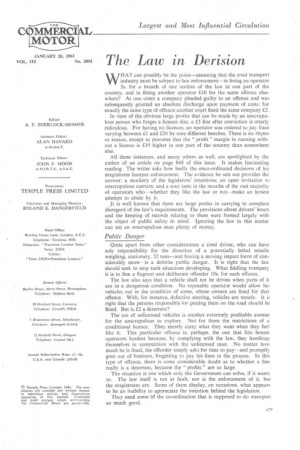The Law in Derision
Page 31

If you've noticed an error in this article please click here to report it so we can fix it.
Nilv/HAT..can possibly be the point—assuming that the road transport industry must be subject to law enforcement—in fining an operator 5s. for a breach of one section of the law in one part of the country, and in fining another operator £10 for the same offence elsewhere? At one court a company pleaded guilty to an offence and was subsequently granted an absolute discharge upon payment of costs; for exactly the same type of offence another court fined the same company £2.
In view of the obvious large profits that can be made by an unscrupulous person who forges a licence disc, a £5 fine after conviction is utterly ridiculous. For having no licences, an operator was ordered to pay fines varying between £1 and £20 by nine different benches. There is no rhyme or reason, except to presume that the " profit " margin in running without a licence is £19 higher in one part of the country than somewhere else.
All these instances, and many others as well, are spotlighted by the author of an article on page 868 of this issue. It makes fascinating reading. The writer asks how badly the unco-ordinated decisions of lay magistrates hamper enforcement. The evidence he sets out provides the answer: a mockery of the legislators' intentions; an open invitation to unscrupulous carriers; and a sour taste in the mouths of the vast majority of operators who —whether they like the law or not—make an honest attempt to abide by it.
Jt is well known that there are large profits in carrying in complete disregard of the law's requirements. The provisions about drivers. hours and the keeping of records relating to them were framed largely with the object of public safety in mind. Ignoring the law in this matter can net an unscrupulous man plenty of money.




















































































































